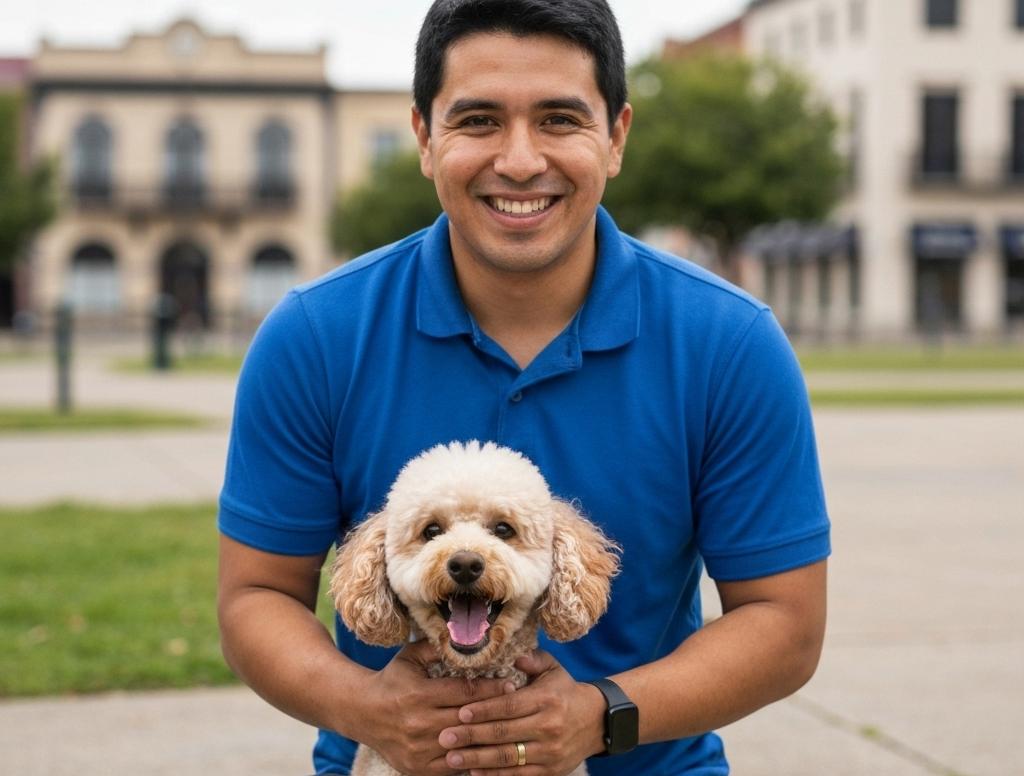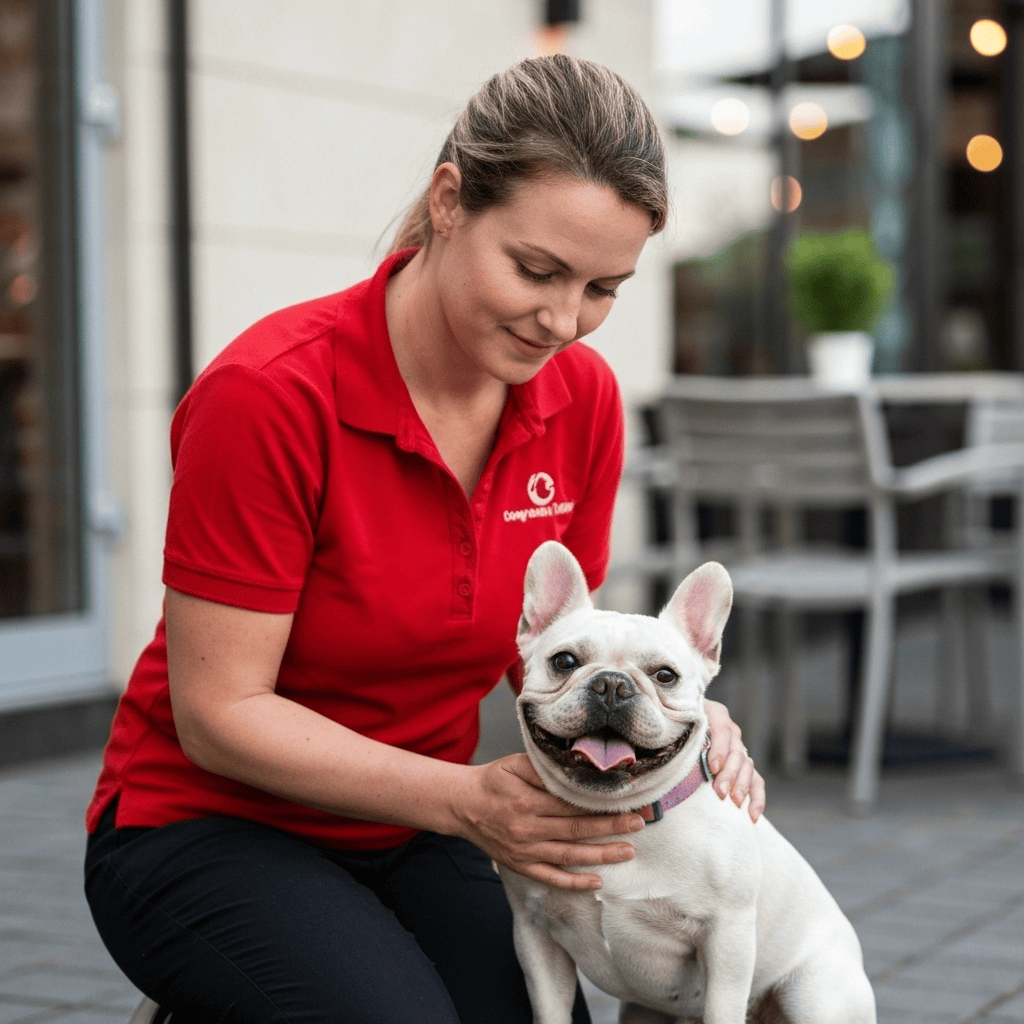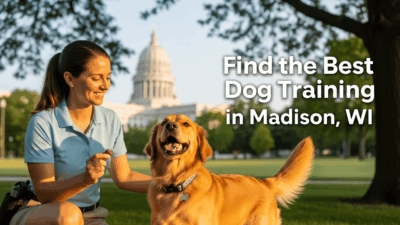Your Complete Guide to Choosing a Dog Trainer in Madison
Living with a dog in Madison means navigating busy sidewalks around Capitol Square, enjoying mellow strolls on the Lakeshore Path, and spending time on patios along Willy Street. Your dog needs to handle all of this with confidence and good manners.
The best training prepares your dog for real life in the city. This means calm leash skills near the UW campus, polite behavior at neighborhood events on the Near East Side, and staying focused around the bustling West Side near Hilldale. Working with someone who understands Dane County rules, knows the local parks, and recognizes common neighborhood distractions will help you see faster, safer progress.
How to Choose the Right Trainer
Start by looking for positive reinforcement training that uses rewards to build the behavior you want. This approach works better in crowded areas and is much easier for families to maintain at home.
Credentials help you quickly compare experience levels. Learn how to evaluate dog trainer certifications, and look for trainers who hold KPA-CTP or CPDT-KA for general coaching. For complex behavior issues, seek out IAABC-CDBC or CBCC-KA certifications, or science-focused programs like CTC.
Ask how they’ll customize a training program for Madison life. Dogs here should practice loose-leash walking on State Street, calm greetings along neighborhood bike paths, and reliable recall before visiting off-leash areas. A trainer who understands these local challenges will be more effective.
In-home dog training works particularly well for puppy training, door manners, and yard reactivity in dense neighborhoods. Group classes become useful once your dog can focus around other dogs, especially before trying busy spots like Capitol Square on Saturday mornings.
If your dog struggles with fear, reactivity, or separation anxiety, make sure the trainer offers behavior modification with careful step-by-step plans and can coordinate with your veterinarian when needed.
Common Dog Training Methods Explained

Basic obedience builds everyday skills like sit, down, stay, recall, leash skills, and place commands. These basics make cafes, community events, and apartment living much smoother for everyone.
Puppy classes focus on socialization, potty training, bite control, crate comfort, and leash training so good habits form early. Starting young prevents many problems that are harder to fix later.
Private lessons let you target specific problem areas at home, while group classes add controlled distractions that prepare your dog for real-world situations. Day training can help when your schedule is tight, offering trainer-led sessions plus clear homework for you to practice.
For advanced goals like therapy dog training or service dog training, look for structured steps, public-access skills, and transparent benchmarks. Always avoid trainers who use tools or tactics that rely on fear or pain.
Average Cost of Dog Training in Madison (Updated for 2025)
Prices vary based on trainer experience, session length, and whether travel is required within Dane County. Expect higher rates for complex behavior cases and lower rates for simple manners training when bought as a package.
| Service Type | Average Cost (Madison/Dane County) |
|---|---|
| Puppy classes, 4–6 weeks | $150–$260 total |
| Group obedience classes, 4–6 weeks | $160–$300 total |
| Private lessons, 60–90 min | $105–$175 per visit |
| In-home coaching packages, 4–6 visits | $420–$850 total |
| Day training, per week | $450–$950 |
| Behavior consultation, initial | $130–$220 |
| Board and train, 2–4 weeks | $1,900–$4,200 total |
Ask what’s included in the price, how progress is measured, and whether a free consultation or evaluation is available before committing to a program.
Questions to Ask a Potential Dog Trainer
- What methods do you use, and how do you keep sessions low-stress for my dog?
- Which credentials do you hold, and do you pursue continuing education such as CPDT-KSA?
- How will you tailor training to our neighborhood and daily routine in Madison?
- Do you offer in-home visits, private lessons, group classes, or day training, and which option fits my goals?
- How will we track progress between training sessions?
- What are the total costs, travel fees inside Dane County, and your cancellation policy?
- Do you carry liability insurance, and can you share proof?
- For aggression or severe reactivity, will you coordinate with my vet if needed?
Local Madison Rules and Considerations
Madison requires dogs to be under control and on leash in public areas unless they’re inside designated off-leash dog parks. You must clean up waste and carry bags at all times.
All dogs must have current rabies vaccination and a valid city dog license if you live within Madison city limits. The Treasurer’s Office handles licensing details and fees, with information available at City of Madison Dog and Cat Licenses.
Excessive barking can be considered a nuisance, especially in apartments and dense neighborhoods near Downtown and the Near West Side. Work with your trainer on quiet cues, enrichment activities, and consistent routines to avoid complaints from neighbors.
Trainers who run classes or sessions in public parks may need permission from the Parks Division. Ask your trainer how they handle permits and proof of insurance if they plan to teach in parks.
Wisconsin sets statewide rabies rules and guidance for bites and exposures. More information is available at Wisconsin DHS Rabies.
Local Madison Resources for Dog Owners
Madison offers several excellent dog parks where you can practice training skills:
Sycamore Park Dog Park on the East Side features a large fenced area with plenty of room to practice recalls and calm check-ins. Warner Park Dog Park on the North Side offers fenced space plus nearby walking paths perfect for cool-downs after play sessions. Quann Park Dog Park, near the Alliant Energy Center, provides an expansive off-leash field that’s excellent for practicing attention around distance distractions.
For current rules, permits, maps, and park conditions, visit Madison Parks Dog Parks.
Insurance and Trainer Requirements in Madison, Dane County, and Wisconsin
Wisconsin doesn’t require a special state license for professional dog trainers. Trainers follow standard business rules and local zoning requirements like any other service business.
If a trainer boards dogs overnight for board and train programs, they must comply with city zoning rules, facility requirements, and any applicable permits. Always ask for proof of current general liability insurance and written safety policies for transport and handling.

Common Questions
How much does in-home dog training cost?
Most Madison trainers charge $105 to $175 per visit, with package discounts available for multiple sessions. Travel within Dane County may add a small additional fee.
Is in-home dog training worth it?
Yes, in-home training is often very effective because it targets problems right where they happen. This includes front-door chaos, leash pulling on your usual walking routes, and barking at hallway noise in apartments. It also speeds up results because the training setup matches your real daily life.
Can you pay someone to house train your dog?
Many trainers offer puppy programs that include schedules, potty training, crate routines, and management strategies for chewing. Day training can jump-start progress while teaching you how to maintain the improvements.
What is the 3-3-3 rule for dog training?
This guideline suggests planning for about 3 days for your dog to decompress in a new situation, 3 weeks to learn new routines, and 3 months to fully settle into them. Training plans in Madison should match this realistic timeline and gradually add city distractions.
How long will it take to reach my training goals?
Most friendly dogs show solid progress in 4 to 8 weeks with daily practice. Reactivity, fear, or aggressive dog training goals typically need several months of careful behavior modification and consistent homework.
What should I bring to group classes?
Bring a flat collar or harness, a 6-foot leash, high-value treats, water, and current vaccination records if requested by the trainer. Skip retractable leashes for safety reasons in group settings.
What’s the leash law in Madison?
Dogs must be leashed and under control in public spaces, except inside designated off-leash dog parks. Keep a standard 6-foot leash handy when walking on sidewalks, trails, and at community events.
Do I need a dog license in Madison or Dane County?
Yes, if you live in the City of Madison, your dog must be licensed annually with proof of rabies vaccination. See complete details at City of Madison Dog and Cat Licenses.
What shots does my dog need in Dane County or Wisconsin?
Rabies vaccination is required statewide by law. Your veterinarian may also recommend distemper-parvo and bordetella vaccines based on your dog’s lifestyle and exposure risks. See state guidance at Wisconsin DHS Rabies.
Are dog trainers required to be licensed in Madison or Dane County or Wisconsin?
No special trainer license exists in Wisconsin. Trainers should follow local business rules, carry liability insurance, and comply with zoning requirements if they host board and train programs.
Where can I practice off-leash recall?
Use fenced dog parks like Sycamore, Warner, or Quann for off-leash practice. Start during quieter hours and keep training sessions short and positive to avoid overwhelming your dog.
Which dog parks allow training around Madison?
City off-leash dog parks allow training as long as you follow posted rules, give other park users space, and keep sessions calm and controlled. Park etiquette and safety always come first.
What beaches and trails allow dogs for training?
Leashed dogs are welcome on most Madison multi-use paths and many park trails. Several parks also offer designated dog beaches on Lakes Mendota and Monona where off-leash activity is allowed within posted boundaries. Check current rules and maps at Madison Parks Dog Parks.
Do trainers need insurance to work in Madison parks?
Parks may require permits and proof of liability insurance for commercial instruction. Ask your trainer how they handle permits and insurance requirements before planning to meet at a public park.
The right combination of humane methods, realistic goals, and steady practice around Downtown, the Near East Side, and the Near West Side will help your dog become a well-behaved companion you can take anywhere. If credentials matter to you, take time to compare options like dog trainer certifications, KPA-CTP, and CPDT-KA so you can choose with confidence.
